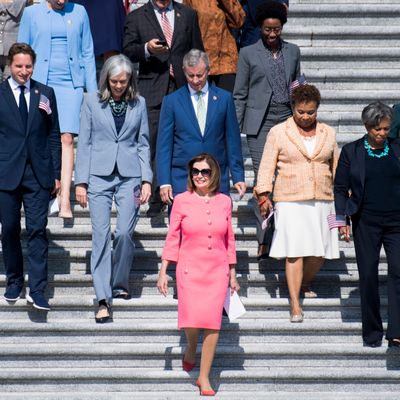
Congressional Republicans love to live off the fat of the land that their fiscal policies — including tax cuts and uninhibited Pentagon spending — provide to donors, lobbyists, and constituents. But when it comes time to pay the bills with debt-limit increases or the deal-making accommodations necessary to get their priorities through a divided Congress, they are sometimes nowhere to be found. That was the case today when — after a budget–debt limit deal was negotiated by Treasury Secretary Steven Mnuchin and House Speaker Nancy Pelosi, and endorsed by their president — Republicans mostly took a powder, as the New York Times reported:
Only 65 Republicans joined the Democratic majority in the 284-149 vote, with 132 Republicans voting against the bill, despite President Trump’s endorsement and pressure from key outside groups, including the Chamber of Commerce, to avoid a potentially catastrophic default on the government’s debt. Democrats were left to get the deal passed, despite misgivings from some liberals over its increases in military spending over the next two years. Only 16 of them voted no.
That’s right: The House Democrats whom Trump was trashing just yesterday saved his bacon on probably the single biggest piece of legislation in Congress this year, with Pelosi doing the heavy lifting. Even two members of “the Squad” that Trump was attacking with racist tweets so recently (Alexandria Ocasio-Cortez and Rashida Tlaib) voted “aye,” despite the fact that the president’s allies in the House Freedom Caucus defected en masse.
Assuming the Senate rubber-stamps the deal with less drama and Trump doesn’t conduct one of his bizarre flip-flops, Congress will be free to go home for its long August recess and high-level fiscal drama will be postponed until after the 2020 elections, as Roll Call explains:
[T]he legislation would avoid a $125 billion decrease in discretionary spending that was set to begin in fiscal 2020 under the 2011 deficit reduction law. It would also suspend the debt limit until July 31, 2021, though Mnuchin says accounting maneuvers could give Treasury until later in the year — removing the possibility, for now, of the country defaulting for the first time since the War of 1812.
Total defense discretionary spending would increase from $716 billion during the current fiscal year to $738 billion during fiscal 2020 and $740.5 billion in fiscal 2021. Nondefense spending would increase from $605 billion during fiscal 2019 to $632 billion in the upcoming fiscal year and $634 billion in fiscal 2021.
The two sides also agreed to avoid “poison pill” policy riders when Congress returns in the fall to pass appropriations bills to implement the deal. It’s essentially a fiscal détente to accompany the vicious partisanship of a high-stakes election cycle.
Presumably, the House Republicans who opposed this legislation will still take credit for the parts of it that benefit them, while blaming the godless socialist Democrats for higher domestic and overall spending. They won’t blame the president, whose agents negotiated it and who endorsed and will sign it, though. Someday, by-and-by, in a second Trump term, they will profess a determination to square circles and return to the fiscal rectitude they still pretend to revere. In the meantime, their slogan could echo the prayer of a young St. Augustine, who was unready to give up the sins of the flesh: “Lord make me pure, but not yet.”






























